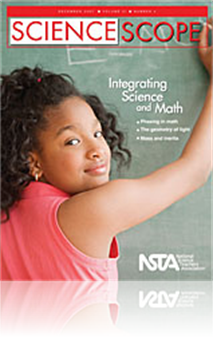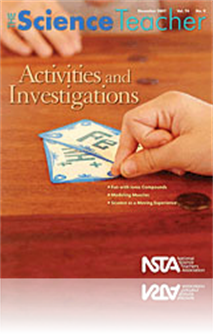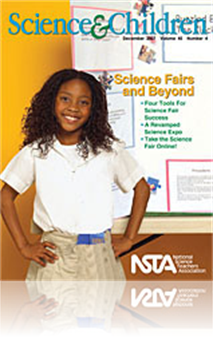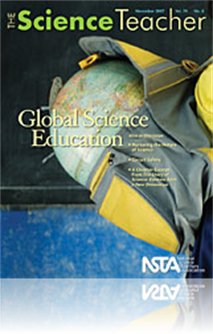All Resources
Journal Article
Science Sampler: Using the IFSMU method to solve mathematical word problems
The author’s experience with middle school learners has taught him that they need structure with the steps in solving mathematical word problems. They need a tool they can rely on if all else fails. As a result, he devised a method called IFSMU, a ...
Journal Article
The experts address the following question in this month’s column: The number 23, portrayed in a recent movie, seems to have an eerie number of life connections. Is there anything special about it?...
Journal Article
Methods and Strategies: Modeling Problem-Based Instruction
Students get excited about science when they investigate real scientific problems in the classroom, especially when the investigation extends over several weeks. This article describes a health-science problem-based learning (PBL) investigation that ...
Journal Article
Safe Science: Using Ionizing Radiation—A Hot Opportunity
The Environmental Protection Agency (EPA) website dealing with education resources reported the results of an inspection, by an environmental engineer, that revealed radioactive materials in a Massachusetts high school. All sources were found within ...
Journal Article
Teaching through Trade Books: Seeing and Sorting Seashells
Have the winter doldrums left your students wistful for summer? Why not initiate a seashell classification activity to rekindle their interest in science and learning! Children love to handle and examine shells at any time of the year—with these fa...
Journal Article
En “light” ening Geometry for Middle School Students
Many science topics can naturally be integrated with a variety of mathematical concepts, including the study of light and optics. In the hands-on activities described here, students explore the properties of light energy while building their understa...
Journal Article
Using A Digital Video Camera to Study Motion
To illustrate how a digital video camera can be used to analyze various types of motion, this simple activity analyzes the motion and measures the acceleration due to gravity of a basketball in free fall. Although many excellent commercially availabl...
Journal Article
Idea Bank: Interrogations on <em> Scientific American</em> Articles
The “Interrogation” approach requires students to read and take notes on assigned Scientific American articles to prepare for question-and-answer discussions (interrogations) based on the assigned articles. This activity helps students learn to...
Journal Article
Ionic bonding is a fundamental topic in high school chemistry, yet it continues to be a concept that students struggle to understand. Even if they understand atomic structure and ion formation, it can be difficult for students to visualize how ions f...
Journal Article
Teaching the anatomy of the muscle system to high school students can be challenging. Students often learn about muscle anatomy by memorizing information from textbooks or by observing plastic, inflexible models. Although these mediums help students ...
Journal Article
Science 101: What makes for a good science fair project?
One way to address this issue is to name a few questions that are not good for science fair projects. Why is the sky blue? Can plants survive without water? and What causes volcanoes? are examples of questions that aren’t so great. The reason the...
Journal Article
By changing the venue from festival to a required academic exposition, the traditional science fair was transformed into a “Science Expo” wherein students were guided away from cookbook experiments toward developing a question about their enviro...
Journal Article
This article presents an engaging activity in which high school students use a dichotomous key to guide the creation and classification of model insects from recycled plastic lids and containers. Besides teaching the use of a dichotomous key and the ...
Journal Article
Science Sampler: Mean, median, mode, and range
A hands-on approach to mean, median, mode, and range turned a simple lab into a two-day opportunity for cooperation among lab-group members and among lab groups. The concepts of accuracy and precision were introduced and distinguished from each other...
Journal Article
Science Sampler: Piñatas, episodic events, and real-life applications
Teaching students to gather and analyze data can be challenging. In particular, many students find the concepts of mean, mode, median, and range to be confusing, even though these concepts are typically introduced to students in second grade, and cov...
Journal Article
Editor’s Roundtable: Science, the ultimate math word problem
Science is a proving ground for skills learned in math classes, and for most students, it is often the first place where they have had to repeatedly use math to answer questions and solve problems. A lack of math skills can have a negative impact on ...
Journal Article
Making and Measuring a Model of a Salt Marsh
Students are often confused by the difference between the terms accuracy and precision. In the following activities, students explore the definitions of accuracy and precision while learning about salt march ecology and the methods used by scientists...
Journal Article
Tried and True: The blue bottle demonstration
The abilities to propose experiments, make observations, and use data to justify conclusions are critical to the scientific process (NRC 1996; NRC 2000). The Blue Bottle Demonstration provides an excellent platform for introducing these skills. The d...
Journal Article
Science Sampler: Sinking and floating—Bringing math to the surface
The concept of density underlies the explanation for a variety of natural phenomena such as weather patterns and plate tectonics. However, we often find that although students can identify the formula d = m/v, they are not able to apply it to other c...
Journal Article
Reflections on Czech Science Teaching
International comparisons help us explore the assumptions made about U.S. schools, students, and pedagogy. That is why the author decided to spend five months in the Czech Republic teaching science education courses at Palacky and Ostrava Universitie...
Journal Article
Draw-a-Scientist/Mystery Box Redux
The sequence of activities presented here—Draw-a-Scientist and the Mystery Box Redux—were designed to help students better understand the nature of science (NOS) and engage them in the process of scientific inquiry. As a result, students begin to...







